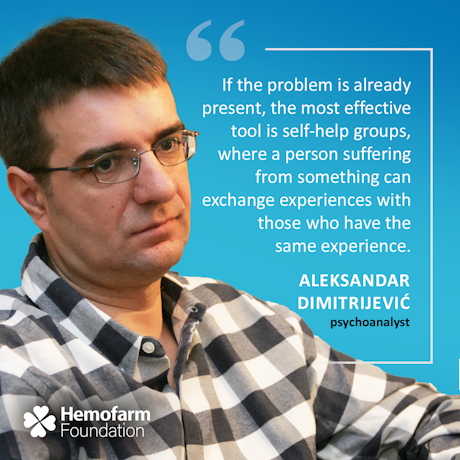
21/10/2024
The Pandemic of Loneliness
Aleksandar Dimitrijevic
psychoanalyst
The Pandemic of Loneliness
Loneliness is historically a relatively new phenomenon, unknown to people throughout most of our history, so the word is not even mentioned in ‘Robinson Crusoe’. Because we are fragile and not independent as a species, humans have always moved in groups and being isolated was seen as a danger. Only when the urbanization accelerated, at the end of the 18th century, did nuclear families emerge in Western Europe, as well as greater alienation in social relations and loneliness.
That loneliness would become a problem could already be seen immediately after the Second World War, due to strengthening tendencies towards individualism, increasingly frequent relocations and, subsequently, due to the excessive use of the Internet and social networks. Everything escalated during the lockdown and imposed social isolation, which led to a kind of pandemic of loneliness.
Different researches confirm high global presence of loneliness. The greatest study which covered 55,000 people, showed that 1/3 of them feel lonely often or very often, and that young people are the most affected group, especially young men, even more than people older than 75 years, that were on top of the list in all previous researches.
We have long known about the devastating effects of chronic loneliness on the brain, heart and overall health. Postoperative wounds heal more slowly in people without social support, they get diabetes or heart attacks more often, their life expectancy is shorter, and their life satisfaction is lower. Chronic loneliness is often compared in its general negative effects to smoking 15 cigarettes a day, but it is even worse than that because people are ashamed of it and then isolate themselves further.
Loneliness has even bigger negative effect on mental health. On one part, isolation, shame and chronic loneliness often from the early childhood, result in someone not being able to bring their inner life closer to others (and where there is no artistic talent, not even to themselves), thus ending up in hopelessness and mental disorder. On the other hand, the stigmatization of mental disorders is still so widespread and pervasive that it leads to avoidance in the workplace, among yesterday's friends, in the building where one lives, even among professionals who are expected to provide crucial help to solve the problem.
These data on the alarming prevalence of loneliness and its disastrous effects on somatic and mental health raise awareness of the necessity of urgent action and prevention of the problem. What else is possible to do here? How can we fight loneliness?
In the narrowest sense, if the problem is already present, the most effective tool is self-help groups, where a person suffering from something can exchange experiences with those who have the same experience (psychiatric patients say this helps more than anything else). Also, group and long-term individual psychotherapy can lead to great progress, as a person can feel that someone (finally) understands and accepts him, and that he understands himself. Finally, at the level of the entire mental health protection system, international trends point to the necessity of introducing work in the community, where patients, with help, continue to work and live outside hospitals, so that their sense of belonging and contributing to the society in which they live is preserved.
When it comes to psychological prevention, serious work is clearly necessary from an early school age in order to develop and encourage the skills of communication, cooperation, tolerance, empathy, dialogue and asking questions.
More and more states are introducing restrictions on the use of social networks for minors, and psychological research confirms that this is necessary. Children experiment the most with ‘online identities’, especially for those who suffer from high social anxiety, this seems like an ideal solution - you reach out to someone, and you can prevent anyone from reaching out to you - which is a shortcut to chronic loneliness.
Finally, it is obvious that modern Western society has harmful effects on our development and emotional well-being, so the basic (capitalist) values of ambition, greed, individuality and ruthlessness should be replaced by solidarity, support, compassion and modesty. This is especially difficult to achieve in Serbia, where the value system is almost completely perverted, and subgroups and divisions are always easily created, so enthusiasm easily disappears. However, we should always remember the importance of this problem and possible initiatives, since the hope is that a larger number of free individuals will unite to solve social problems and overcome their own loneliness.

AUTHOR
Aleksandar Dimitrijevic
psychoanalyst